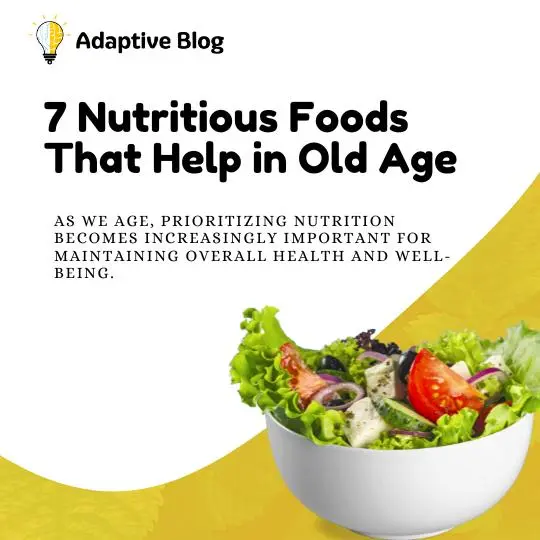7 Nutritious Foods That Help in Old Age

Nourish Your Golden Years with 7 Nutritious Foods That Promote Health in Old Age
As we age, prioritizing nutrition becomes increasingly important for maintaining overall health and well-being.
A balanced diet rich in nutrients not only provides support to physical health but also plays an important role in preserving cognitive function and promoting longevity.
In short, when we get older over time, it stands really important for every one of us to carry on to eat well and also, majorly healthy.
Changes in your body might cause lower calorie requirements, thus, making it quite necessary to lower portion sizes if activity is low, and to cut down on sugary snacks like buns and cakes.
In this blog post, we will explore seven nutritious foods that are particularly beneficial for older adults, helping them thrive in their golden years.
Leafy Greens
Leafy greens such as spinach, kale, etc. are nutritional powerhouses totally jam-packed with vitamins, minerals, and antioxidants.
These greens are rich in vitamin K, which is essential for bone health and may help reduce the risk of osteoporosis.
Additionally, they contain lutein and zeaxanthin, antioxidants that support eye health and may reduce the risk of age-related macular degeneration (AMD).
Incorporating leafy greens into meals and salads is an excellent way for older adults to boost their intake of essential nutrients and support overall health.
Fatty Fish
Fatty fish like salmon, mackerel, and sardines are rich sources of omega-3 fatty acids, which have been linked to various health benefits, majorly for older adults.
Omega-3 fatty acids are known for their anti-inflammatory properties, which may help in lowering the risk of chronic diseases such as heart disease, arthritis, and Alzheimer’s disease.
These fatty acids also provide support for brain health and cognitive function, promoting sharper memory and cognitive skills in old adults.
Aim to incorporate fatty fish into your diet at least twice a week to reap the full benefits of omega-3 fatty acids.
Berries
Berries such as blueberries, strawberries, and raspberries are not only delicious but also possess incredible nutritional value.
These vibrant fruits are loaded with antioxidants, including flavonoids and anthocyanins, which have been shown to have anti-inflammatory and neuroprotective effects.
Consuming berries regularly may help improve cognitive function, enhance memory, and reduce the risk of age-related cognitive decline.
Whether enjoyed fresh, frozen, or blended into smoothies, berries are a tasty and convenient way for older adults to boost their intake of antioxidants and support brain health.
Greek Yogurt
Greek yogurt is an excellent source of protein, calcium, and probiotics, making it a valuable addition to the diet of old-aged adult people.
Protein is important to maintain muscle mass and strength, which becomes increasingly important as we age for the prevention of sarcopenia and maintaining mobility.
Calcium is crucial for bone health, helping to reduce the risk of osteoporosis and fractures.
The probiotics found in Greek yogurt support digestive health and may help alleviate symptoms of irritable bowel syndrome (IBS) and promote a healthy gut microbiome.
Enjoy Greek yogurt as a nutritious piece of snack or incorporate it into smoothies and parfaits for a satisfying and healthful treat.
Nuts and Seeds
Nuts and seeds are nutritious foods that offer various health benefits for older adults.
Almonds, walnuts, chia seeds, and flaxseeds are particularly noteworthy for their high content of omega-3 fatty acids, fiber, and antioxidants. These are nutritious foods.
These nutrients support heart health, provide aid in the digestion process, and may help lessen the risk of chronic diseases such as diabetes and cancer. The
Additionally, nuts and seeds are convenient and versatile, making them an ideal snack option for older adults looking to boost their nutrient intake and maintain overall health.
Whole Grains
Whole grains such as quinoa, brown rice, oats, and barley are excellent sources of fiber, vitamins, and minerals, making them a crucial element of a healthy diet for older adults.
Fiber is crucial for digestive health, promoting regularity and preventing constipation, a common issue among older adults.
Additionally, whole grains provide sustained energy, helping to stabilize blood sugar levels and prevent spikes and crashes.
Incorporating whole grains into meals such as salads, soups, and stir-fries is an easy way for older adults to increase their fiber intake and support overall health.
Colorful Vegetables
Colorful vegetables like bell peppers, carrots, and tomatoes are visually appealing and packed with essential nutritional values that enhance one’s health and vitality in older adults. They are nutritious foods.
These vegetables are rich in vitamins, minerals, and antioxidants, which help protect against chronic diseases and support overall well-being.
Bell peppers are high in vitamin C, which boosts immune function and supports skin health. On the other hand, carrots are loaded with beta-carotene, which promotes eye health and may reduce the risk of age-related macular degeneration.
Including a variety of colorful vegetables in meals ensures a diverse range of nutrients, helping older adults maintain optimal health as they age.
7 Nutritious Foods
Incorporating these seven nutritious foods into your diet can provide a multitude of health benefits for older adults, supporting their overall well-being and promoting their longevity as well.
Though no single food item provides all the essential nutrients one may require, it is important to include a wide variety of foods in the diet.
By prioritizing nutritious foods suggested by the best joint replacement surgery in Delhi NCR and maintaining a balanced diet, older adults can nourish their bodies and minds.
This would ensure a vibrant and fulfilling life in their golden years.
Also Read: Healthy Food Options to Consider while Ordering food on Trains
Conclusion
There are many factors such as cutting down on sugar, and salt, consuming alcohol, eating in less quantities, healthy eating, and so on that leave an impact on the human body.
It is important to eat at regular intervals, at least three times a day, but there are chances that you might end up eating less because you find it difficult to cook or you might have developed chronic conditions like arthritis.
To collect more information about your musculoskeletal system, visit the best orthopedic surgeon in India and get your queries answered.





